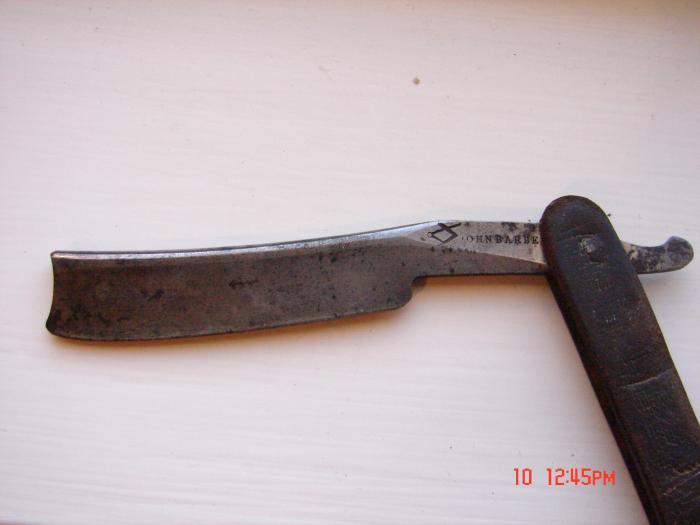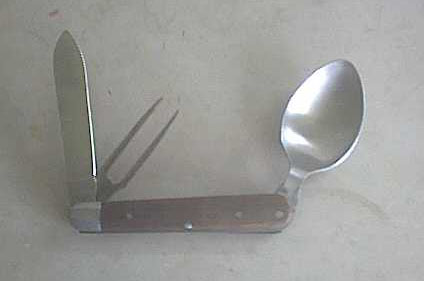Results 1 to 10 of 80
Hybrid View
-
09-01-2011, 04:47 PM #1

Wouldn't a panish point be even better for that kind of fine shaving work?
Til shade is gone, til water is gone, Into the shadow with teeth bared, screaming defiance with the last breath.
To spit in Sightblinder’s eye on the Last Day
-
09-01-2011, 04:56 PM #2

Panish point?

Just by looking at the older Sheffield styles, it seems like the notch and the spanish points may have separately evolved from points like these

Maybe with the advent of better hollowing technique using smaller wheels, the small wheels were naturally used to accent the razor design by creating smaller and differently sized notches in later years. This is all conjecture of course, just like everything else you've read regarding the supposedly original purpose of the barber's notches. But just like with the rest of the straight razor (no training wheels, you get full control), how you use it and how effective you want it to be is totally up to you
PS something else that is interesting to note is the comparative lives of barbers notches and the threads devoted to them. Just like the notches themselves, the threads have no apparent origin and cannot be definitively answered, yet they remain popular and are sure to keep popping up in the days, months, and years to come. Thank you Jimmy for creating another equally unique* entry in the neverending barber notch discussion book
For an explanation of the REAL real deal on the barber's notch go to this thread (just replace the word scuttle with barbers notch) here. The first person with a dozen threads dedicated to the barbers notch wins!
* the phrase "equally unique" is mine and mine alone. If you want a cool phrase too, you'll have to come up with something equally unique - er... hmm.Last edited by hoglahoo; 09-01-2011 at 05:16 PM. Reason: equal rights for all!
Find me on SRP's official chat in ##srp on Freenode. Link is at top of SRP's homepage
-
09-01-2011, 05:46 PM #3At this point in time...




- Join Date
- Jun 2007
- Location
- North Idaho Redoubt
- Posts
- 27,068
- Blog Entries
- 1
Thanked: 13249
Can't we at least agree to call it by it's real name ??? and I think once we do, then we can simply ask the same question of all points..
What is the purpose of the
*Hollow Point aka Barber's Notch
Round point
Square point
Spike point
Spanish point
French/Oblique point
Dreadnought point
Etc: etc:
I tend to agree with the Hoglahoo if you start looking at the points on razors starting at 1800 you can kinda see a pattern there
*As of this point in time no one has ever found a pre-1970's factory or advertising reference to the name "Barber's Notch" in the old references they are called either Hollow Point or Hollow Notch razors...
-
The Following 4 Users Say Thank You to gssixgun For This Useful Post:
august11231 (09-05-2011), Caledonian (09-04-2011), engine46 (06-19-2015), WillN (09-05-2011)
-
09-01-2011, 06:06 PM #4

Dutch point, aka Round point.
Alex Ts.
-
The Following User Says Thank You to manah For This Useful Post:
gssixgun (09-01-2011)
-
09-01-2011, 06:25 PM #5

The point is ..... Glen's post listing the various styles illustrates ... the point .... that they were modified with a purpose in mind. IMO anyway. A Spanish or Oblique, a hollow, or a spike. The round is/was probably for safety and speed while a barber's notch ..... more correctly called a hollow for maneuvering around nostrils and a French or a Spanish for reaching difficult areas more efficiently. Just thinking these various points were motivated out of a utilitarian motive rather than style.
Be careful how you treat people on your way up, you may meet them again on your way back down.
-
09-01-2011, 06:59 PM #6

Is there a reason why a certain point has a geographical name attached to it?
I mean, it would be an interesting research line. Is the geographical attribution due to the place where it has been invented? Or to the place where it was, at a certain moment through history, a state of the art shape? Specialized producers? Some very old urban legend? Or what else?
Has anybody ever investigated on this?
It could be a lot of fun...
-
09-01-2011, 07:44 PM #7There is no charge for Awesomeness



- Join Date
- Aug 2006
- Location
- Maleny, Australia
- Posts
- 7,977
- Blog Entries
- 3
Thanked: 1587
I'm flabbergasted that after all this time, when these threads come up, people still forget the Lou point! And I think therein lies the secret to the points. Lots of old 19th century dudes, sitting around over a quiet tankard or two in the local hostelry, trying to one-up each other over who can come up with the funniest razor nose. Parchment and charcoal are called for, and the rest, as they say, is history.
James.<This signature intentionally left blank>
-
09-01-2011, 08:35 PM #8'tis but a scratch!



- Join Date
- Oct 2010
- Location
- Durango, Colorado
- Posts
- 2,080
- Blog Entries
- 2
Thanked: 443
It would be useful to extend and slightly spoon out the spine half of that hollow point, so it could have a scooping action.
"These aren't the droids you're looking for." "These aren't the droids we're looking for." "He can go about his business." "You can go about your business."
-
09-01-2011, 09:26 PM #9
-
09-01-2011, 09:39 PM #10

I eat pie with mine...I mean, wait, what are we talking about?

Still the best argument I've heard for the notch is NOT nose hair trimming. Noses vary too greatly, and a French/Spanish point razor would do as good or better a job. Not to mention that as long as there have been scissors, they've made small narrow pairs for trimming noses, pairs that work in small noses as well as bigguns! No, the best argument I've heard is that the notches were a development by post-war amputees for opening the razor; which is surprisingly hard to do one handed without a notch, particularly with a round pointed blade. The utility of said modification was not lost on manufacturers who then produced notch point razors. Eventually the more marketable segment for said razors was the barber, who still had use for such notched razors after King G's invention became the more logical choice for the shaving impaired. The result then was that the notch was associated with those who most commonly owned and used them: barbers.


 91Likes
91Likes LinkBack URL
LinkBack URL About LinkBacks
About LinkBacks








 Reply With Quote
Reply With Quote




